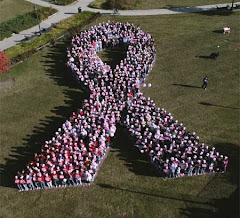Sunday, November 23, 2008
Another Successful RFA
On November 18th, exactly two weeks after my last RFA on November 4th, I went back to Johns Hopkins for another ablation, this time on my left lung. Dr. Georgiades successfully ablated two more tumors, bringing the total ablation count to six. I now only have two small tumors, also in my left lung, which we will go after early next year. This last RFA was a little bumpy. My lung collapsed about 10%, but we were able to fix it with a small chest tube. I never felt any symptoms from it, but I needed to stay in the hospital an extra day to have it corrected. This is called a pneumothorax and it happens every now and then when a lung is pierced during a procedure or surgery.
Recovering from an ablation has been different each of the three times I’ve had this done. I find it interesting how the body reacts differently to an assault based on the location of the battlefield. The recovery time is usually 2 or 3 days, possibly followed by a little soreness for about a week. Sometimes the soreness is in places that are nowhere near where you would expect it to be. This is known as referred pain. Sometimes I had a cough after an ablation, as my body rallied to recover itself from the inflammation caused by the burning of the tumor and surrounding tissue.
Because I was given conscious sedation, or twilight sleep, instead of general anesthesia, I drifted in and out during each procedure. I like seeing and hearing what’s happening, and Dr. Georgiades is really good at explaining what he’s doing at each step. Of course I’m pretty groggy, so I only remember bits and pieces, but I would rather catch as much of the action as possible, since I’m pretty fascinated by RFA procedures and what they offer.
I’ll get a follow up PET/CT scan in late January, after all the inflammation has subsided, to make sure that all 6 ablated tumors are completely dead, and to decide when to ablate the last two. That will give my body a chance to fully recover from a pretty active month. I’m still in disbelief that all 11 tumors that were found in or since October 2006 will soon be history (3 removed surgically in 2006 and 8 by RFA). There is so much to be grateful for this Thanksgiving season.
Kathy
CANcer + HEALth = CAN HEAL
Recovering from an ablation has been different each of the three times I’ve had this done. I find it interesting how the body reacts differently to an assault based on the location of the battlefield. The recovery time is usually 2 or 3 days, possibly followed by a little soreness for about a week. Sometimes the soreness is in places that are nowhere near where you would expect it to be. This is known as referred pain. Sometimes I had a cough after an ablation, as my body rallied to recover itself from the inflammation caused by the burning of the tumor and surrounding tissue.
Because I was given conscious sedation, or twilight sleep, instead of general anesthesia, I drifted in and out during each procedure. I like seeing and hearing what’s happening, and Dr. Georgiades is really good at explaining what he’s doing at each step. Of course I’m pretty groggy, so I only remember bits and pieces, but I would rather catch as much of the action as possible, since I’m pretty fascinated by RFA procedures and what they offer.
I’ll get a follow up PET/CT scan in late January, after all the inflammation has subsided, to make sure that all 6 ablated tumors are completely dead, and to decide when to ablate the last two. That will give my body a chance to fully recover from a pretty active month. I’m still in disbelief that all 11 tumors that were found in or since October 2006 will soon be history (3 removed surgically in 2006 and 8 by RFA). There is so much to be grateful for this Thanksgiving season.
Kathy
CANcer + HEALth = CAN HEAL
Subscribe to:
Post Comments (Atom)

.bmp)
No comments:
Post a Comment
If you don't have a Google email account and you don't know which "profile" to choose, select the Anonymous option. If you'd like your name to appear, you may sign your comment. Thank you!